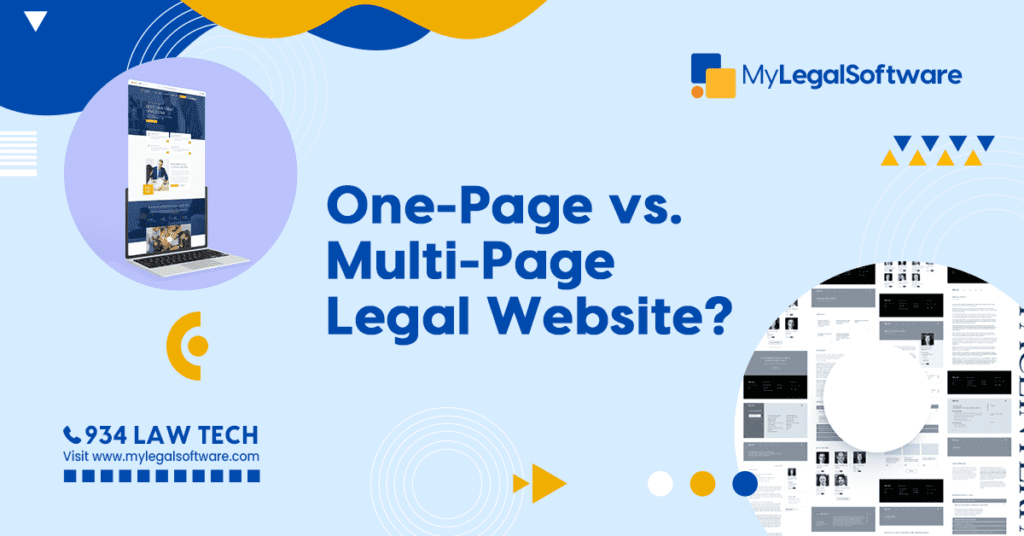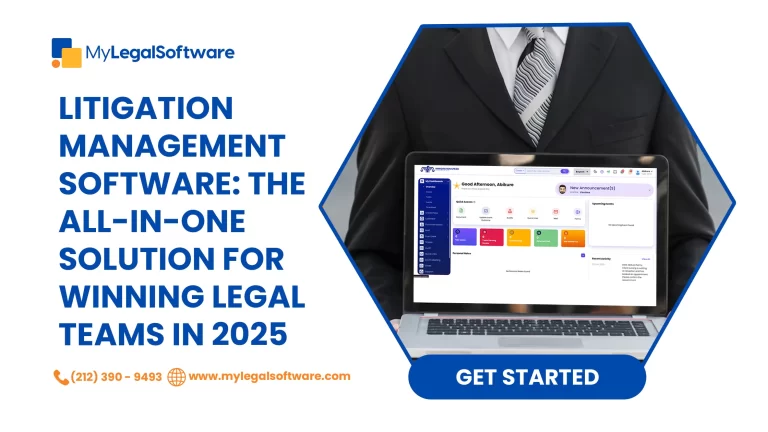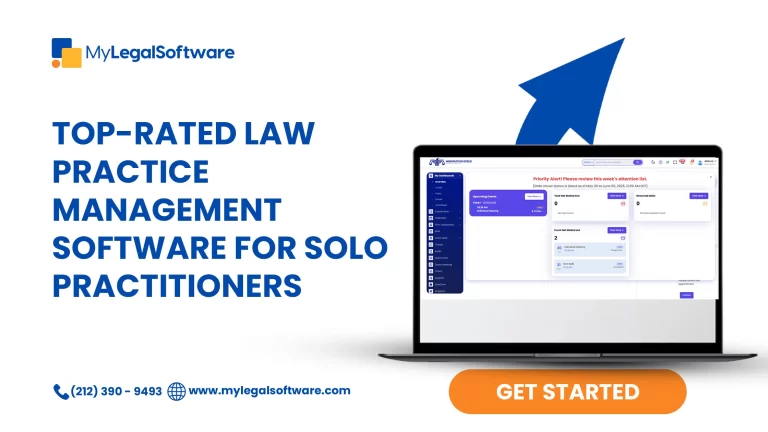A well-designed legal website be it a multi page legal website or single is no longer a luxury for law firms; it’s an essential tool for attracting clients, building trust, and establishing a strong online presence.
But with so many design choices, one of the most critical decisions for legal professionals is: “One-page or multi-page legal website, what should my law firm have?”
This choice can feel like navigating a legal labyrinth. On one hand, sleek, one-page websites boast simplicity and mobile-friendliness, promising a laser focus on your core services.
On the other hand, multi-page websites offer comprehensive information, SEO advantages, and the ability to showcase your firm’s breadth of expertise.
This article is your roadmap to navigating this digital crossroads. We’ll delve into the pros and cons of each format, explore how to align your choice with your firm’s unique needs, and equip you with the knowledge to confidently build a Legal website that wins cases and clients.
Key Takeaways
- Understand the distinct advantages and limitations of one-page and multi-page legal websites for law firms.
- Learn how to tailor your legal website format to your firm’s size, specialization, target audience, and marketing goals.
- Discover practical tips for ensuring your legal website is accessible, content-rich, and optimized for search engines.
- Gain valuable insights from real-world case studies of successful law firm websites.
By the end of this article, you’ll be empowered to make an informed decision about your law firm’s digital future, ensuring your website becomes a powerful asset in your legal arsenal.
One-Page vs. Multi-Page Legal Website: Which is for your law firm?
Before choosing your legal website format, it’s essential to understand the fundamentals of one-page and multi-page websites.
Think of them as two separate digital entry points leading to your firm’s expertise.
One-Page Legal Websites
A one-page website condenses all your vital information onto a single, beautifully designed canvas. The navigation is minimalist, guiding users through a carefully curated description of your firm’s strengths, practice areas, and achievements.
One-Page Legal Website Pros:
- Mobile-First Focus: In today’s mobile-driven world, one-page sites shine. Their streamlined structure translates easily to smaller screens, ensuring a seamless user experience for on-the-go clients.
- Clarity and Concision: A single page forces you to prioritize the most critical information, crafting a laser-focused message that resonates with visitors. A perfect description for this would be an elevator pitch, where only the relevant information is kept.
- Cost-Effective Entry Point: Compared to multi-page websites, one-page options can be more budget-friendly, often requiring less development time and ongoing maintenance.
One-Page Legal Website Cons:
- Content Constraints: While captivating, one-page layouts have limited real estate. Complex legal services or extensive experience may struggle to find room on a single web page.
- SEO Challenges: Search engines love content and variety. Single pages, while impactful, offer less space for keyword optimization, potentially impacting discoverability in online searches.
- Navigational Simplicity: While minimalist navigation offers ease of use, it may not cater to users seeking in-depth exploration of your firm’s offerings.
Multi-Page Legal Websites:
Think of a multi-page legal website as a spacious digital real estate for your law firm. Each page acts as a dedicated room, showcasing a specific service, team member, or area of expertise.
Navigation menus provide a roadmap for visitors to explore every facet of your legal expertise.
Multi-page legal website Pros:
- Amplified Content: Multi-page websites offer ample space for detailed information, case studies, client testimonials, and blog posts. This comprehensive content fuels your SEO fire, boosting your online visibility.
- Expertise Showcase: With dedicated pages for each practice area, you can delve deeper into your legal specialties, demonstrating your team’s knowledge and experience.
- Navigational Nuance: Multi-page layouts allow for more complex navigation structures, catering to users who prefer targeted searches and in-depth explorations.
Multi-page legal website Cons:
- Complexity: Multi-page layouts can be complex to navigate, requiring careful planning and intuitive design to avoid confusing users.
- Cost Considerations: The additional pages and functionalities of a multi-page website typically translate to higher development and maintenance costs compared to one-page alternatives.
- Content Creation Commitment: Filling multiple pages with compelling content requires ongoing dedication and a robust content strategy.
One-Page vs. Multi-Page Legal Website: Finding Your Law Firms Match
Both one-page and multi-page websites offer unique advantages and challenges. You must understand that choosing the right website format isn’t a one-size-fits-all solution. Just like tailored suits, your website should perfectly complement your firm’s unique needs and aspirations. So, before delving into design details, let’s explore key factors that will guide you towards the ideal format:
1. Size and Scope:
- Boutique or Solo Firm: If your firm focuses on a specific niche with a close-knit clientele, a one-page website might be your digital haven. The streamlined layout offers a concentrated punch, highlighting your core expertise and fostering a personal connection with potential clients.
- Larger Firms: For firms with diverse practice areas and a broader client base, a multi-page website is often the better choice. This format allows you to showcase the full spectrum of your legal prowess, with dedicated pages for each practice area, team member profiles, and even informative blog posts.
2. Knowing Your Audience:
- Tech-Savvy Seekers: If your target audience thrives on a quick and efficient online experience, a one-page website with impactful visuals and user-friendly navigation might be the key to turning clicks into consultations.
- In-Depth Explorers: Do your ideal clients seek detailed information and comprehensive resources? A multi-page website can cater to their investigative nature, offering in-depth case studies, detailed service descriptions, and downloadable client resources.
3. Marketing and SEO Goals:
- Short-Term Campaigns: Launching a temporary initiative like a specific practice expansion or a limited-time offer? A one-page website can quickly communicate your message and drive conversions, making it ideal for short-term marketing campaigns.
- Long-Term Growth: For those seeking a sustainable online presence and consistent lead generation, a multi-page website offers robust SEO potential. With multiple pages, you can target a wider range of keywords, organically increasing your discoverability in search engine results.
4. Budget Considerations:
- Cost-Conscious Cautiousness: One-page websites often require less development time and ongoing maintenance, making them a budget-friendly option for firms navigating financial constraints.
- Investing in Growth: Multi-page websites, while offering broader functionality and SEO advantages, also involve higher development and maintenance costs. Weigh the long-term benefits against the initial investment to determine if this format aligns with your budget.
One-Page vs. Multi-Page Legal Website: Illustrative Case Study
Let’s see how two law firms, each with distinct needs, found their perfect website format:
- Case Study (One-Page Legal Website) Acme Law, a boutique personal injury firm specializing in motorcycle accidents, chose a one-page website. Their site features a compelling video testimonial alongside clear calls to action, ensuring potential clients can connect instantly. This straightforward approach resonated with their tech-savvy target audience, resulting in a significant increase in case inquiries.
- Case Study (Multi-Page Law Firm Website): Goliath Legal, a large firm with various practice areas, opted for a multi-page website. Each practice area has a dedicated page showcasing expertise, case studies, and team profiles. This comprehensive approach boosted their SEO ranking and attracted diverse clients seeking specific legal solutions.
One-page vs. multi-page legal website: A flow chart to guide your law firm’s decisions.
Feeling overwhelmed by the “one-page vs. multi-page” dilemma? This simple flowchart can help you navigate the decision-making process:
| Start | Question | Yes | No | Decision |
| Is your firm small or niche-focused? | Consider a one-page website | Proceed | ||
| Do you offer diverse services and cater to a broad audience? | Consider a multi-page website | Proceed | ||
| Are you prioritizing short-term campaigns or temporary initiatives? | Consider a one-page website | Proceed | ||
| Is budget a primary concern? | A one-page website might be more cost-effective | Both formats are viable |
Beyond the Law Firms Website Format
While choosing the right format is critical, remember these additional aspects for website success:
1. Accessibility First
Regardless of format, ensure your website complies with ADA website accessibility standards. This creates an inclusive experience for all potential clients, including those with disabilities.
2. Content is King (and Queen)
No matter how beautiful your design, high-quality content is the backbone of any effective website. Invest in compelling copywriting, informative blog posts, and engaging video testimonials to capture attention and convert visitors into clients.
3. Data-Driven Decisions
Don’t set it and forget it! Utilize website analytics to track user behavior, identify areas for improvement, and A/B test different elements to constantly optimize your legal website’s performance.
4. Embrace professional help
Building a successful legal website requires expertise. Consider partnering with experienced legal website developers like MyLegalSoftware, who can guide you through the entire process, from choosing the right format to crafting impactful content and ensuring ADA compliance.
Conclusion: Building Your Digital Bridge to Justice with a Legal Website Made for Your Law Firm
Navigating the choice of a one-page versus multi-page legal website for your law firm can feel daunting. But by carefully considering your firm’s needs, target audience, goals, and all of the information provided in this article, you can confidently build a website that becomes your cornerstone in the online legal space.
Remember the following:
- Tailor your choice. A one-page legal website might be the perfect showcase for your niche expertise, while a multi-page format allows you to demonstrate the full depth and breadth of your legal prowess.
- Content is king (and queen). No matter the format, invest in compelling content that informs, engages, and builds trust with potential clients.
- Embrace accessibility. Ensure your website welcomes everyone, regardless of ability, by adhering to ADA standards.
- Data drives progress. Track performance and adapt your website to user behavior for continuous improvement.
Choosing the right format is just the first step. Partnering with experienced legal website developers, like MyLegalSoftware, can take your online presence to the next level.
Their expertise in design, development, SEO, and content creation can transform your website into a powerful tool for attracting clients.
Don’t let the digital divide hold you back. Visit MyLegalSoftware today and take advantage of a free consultation to discuss your law firm’s vision and discover how they can help you build a Legal website that reflects your dedication to legal excellence.
Let them guide you toward crafting your firm’s digital masterpiece, a website that stands testament to your commitment to service, justice, and success.








